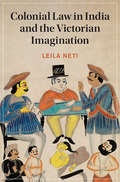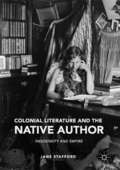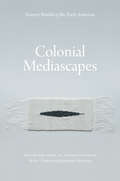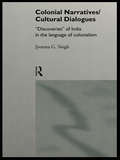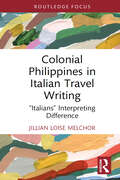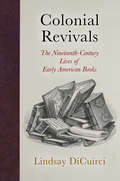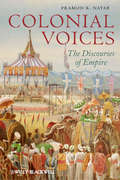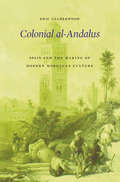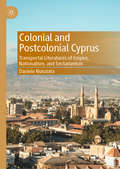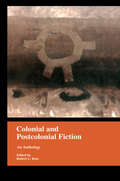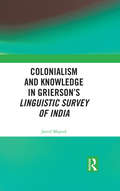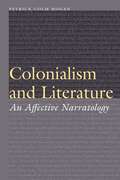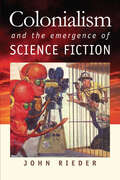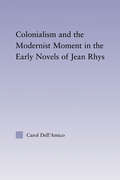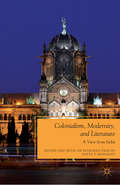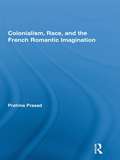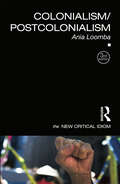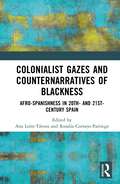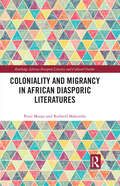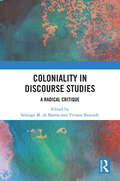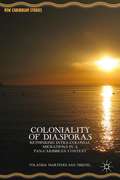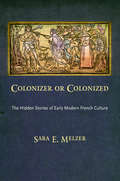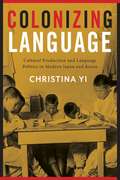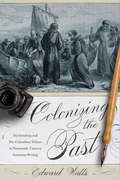- Table View
- List View
Colonial Law in India and the Victorian Imagination (Cambridge Studies in Nineteenth-Century Literature and Culture #128)
by Leila NetiSituated at the intersection of law and literature, nineteenth-century studies and post-colonialism, Colonial Law in India and the Victorian Imagination draws on original archival research to shed new light on Victorian literature. Each chapter explores the relationship between the shared cultural logic of law and literature, and considers how this inflected colonial sociality. Leila Neti approaches the legal archive in a distinctly literary fashion, attending to nuances of voice, character, diction and narrative, while also tracing elements of fact and procedure, reading the case summaries as literary texts to reveal the common turns of imagination that motivated both fictional and legal narratives. What emerges is an innovative political analytic for understanding the entanglements between judicial and cultural norms in Britain and the colony, bridging the critical gap in how law and literature interact within the colonial arena.
Colonial Literature and the Native Author: Indigeneity and Empire
by Jane StaffordThis book is the first study of writers who are both Victorian and indigenous, who have been educated in and write in terms of Victorian literary conventions, but whose indigenous affiliation is part of their literary personae and subject matter. What happens when the colonised, indigenous, or 'native' subject learns to write in the literary language of empire? If the romanticised subject of colonial literature becomes the author, is a new kind of writing produced, or does the native author conform to the models of the coloniser? By investigating the ways that nineteenth-century concerns are adopted, accommodated, rewritten, challenged, re-inscribed, confronted, or assimilated in the work of these authors, this study presents a novel examination of the nature of colonial literary production and indigenous authorship, as well as suggesting to the discipline of colonial and postcolonial studies a perhaps unsettling perspective with which to look at the larger patterns of Victorian cultural and literary formation.
Colonial Mediascapes: Sensory Worlds of the Early Americas
by Matt Cohen Jeffrey GloverIn colonial North and South America, print was only one way of communicating. Information in various forms flowed across the boundaries between indigenous groups and early imperial settlements. Natives and newcomers made speeches, exchanged gifts, invented gestures, and inscribed their intentions on paper, bark, skins, and many other kinds of surfaces. No one method of conveying meaning was privileged, and written texts often relied on nonwritten modes of communication. Colonial Mediascapes examines how textual and nontextual literatures interacted in colonial North and South America. Extending the textual foundations of early American literary history, the editors bring a wide range of media to the attention of scholars and show how struggles over modes of communication intersected with conflicts over religion, politics, race, and gender. This collection of essays by major historians, anthropologists, and literary scholars demonstrates that the European settlement of the Americas and European interaction with Native peoples were shaped just as much by communication challenges as by traditional concerns such as religion, economics, and resources.
Colonial Narratives/Cultural Dialogues: 'Discoveries' of India in the Language of Colonialism
by Jyotsna SinghColonial Narratives/Cultural Dialogues demonstrates the continuing validity of the colonial paradigm as it maps the geographical, political, and imaginative space of 'India/Indies' from the seventeenth century to the present. Breaking new ground in postcolonial studies, Jyotsna Singh highlights the interconnections among early modern colonial encounters, later manifestations in the Raj and their lingering influence in the postcolonial Indian nationalist state. Singh challenges the assumption of eye-witness accounts and unmeditated experiences implcit in colonial representational practices, and often left unchallenged in the postcolonial era. Essential introductory reading for students and academics, Colonial Narratives/Cultural Dialogues re-evaluates the following texts: * seventeenth century travel narratives about India * eighteenth century 'nabob' texts * letters of the Orientalist, Sir William Jones * reviews of Shakespearean productions in Calcutta and postcolonial Indo-Anglian novels
Colonial Philippines in Italian Travel Writing: “Italians” Interpreting Difference (Routledge Focus on Literature)
by Jillian Loise MelchorThe first comprehensive review of all extant "Italian" chronicles set in the Philippine Islands, this book juxtaposes "Filipino" Otherness with the unique condition of "Italian" ambivalence and alterity within Europe.This book's contribution to the critical studies of travel is the opening of an analytical middle ground, highlighting the ambivalence of Italian chroniclers while acknowledging their participation in epistemological practices subsumed within the broader enterprise of conquest.Beyond the role of travel writing in colonial episteme, the book also situates the act of writing about one’s travels in instances of national character building (in Italy’s case) and in attempts of constructing a national historiography (in the Philippines' case). This manner of nuancing literary productions by the West while navigating its implications in the East, specifically, how pre-Unification “Italian” travel informed nationalist constructions in the Revolutionary Philippines, could enrich our understanding of and refract monolithic conceptions of metropole−periphery relations.
Colonial Revivals: The Nineteenth-Century Lives of Early American Books (Material Texts)
by Lindsay DiCuirciIn the long nineteenth century, the specter of lost manuscripts loomed in the imagination of antiquarians, historians, and writers. Whether by war, fire, neglect, or the ravages of time itself, the colonial history of the United States was perceived as a vanishing record, its archive a hoard of materially unsound, temporally fragmented, politically fraught, and endangered documents.Colonial Revivals traces the labors of a nineteenth-century cultural network of antiquarians, bibliophiles, amateur historians, and writers as they dug through the nation's attics and private libraries to assemble early American archives. The collection of colonial materials they thought themselves to be rescuing from oblivion were often reprinted to stave off future loss and shore up a sense of national permanence. Yet this archive proved as disorderly and incongruous as the collection of young states themselves. Instead of revealing a shared origin story, historical reprints testified to the inveterate regional, racial, doctrinal, and political fault lines in the American historical landscape.Even as old books embodied a receding past, historical reprints reflected the antebellum period's most pressing ideological crises, from religious schisms to sectionalism to territorial expansion. Organized around four colonial regional cultures that loomed large in nineteenth-century literary history—Puritan New England, Cavalier Virginia, Quaker Pennsylvania, and the Spanish Caribbean—Colonial Revivals examines the reprinted works that enshrined these historical narratives in American archives and minds for decades to come. Revived through reprinting, the obscure texts of colonial history became new again, deployed as harbingers, models, reminders, and warnings to a nineteenth-century readership increasingly fixated on the uncertain future of the nation and its material past.
Colonial Voices: The Discourses of Empire
by Pramod K. NayarThis accessible cultural history explores 400 years of British imperial adventure in India, developing a coherent narrative through a wide range of colonial documents, from exhibition catalogues to memoirs and travelogues. It shows how these texts helped legitimize the moral ambiguities of colonial rule even as they helped the English fashion themselves.An engaging examination of European colonizers' representations of native populationsAnalyzes colonial discourse through an impressive range of primary sources, including memoirs, letters, exhibition catalogues, administrative reports, and traveloguesSurveys 400 years of India's history, from the 16th century to the end of the British Empire Demonstrates how colonial discourses naturalized the racial and cultural differences between the English and the Indians, and controlled anxieties over these differences
Colonial al-Andalus: Spain and the Making of Modern Moroccan Culture
by Eric CalderwoodThrough state-backed Catholicism, monolingualism, militarism, and dictatorship, Spain’s fascists earned their reputation for intolerance. It may therefore come as a surprise that 80,000 Moroccans fought at General Franco’s side in the 1930s. What brought these strange bedfellows together, Eric Calderwood argues, was a highly effective propaganda weapon: the legacy of medieval Muslim Iberia, known as al-Andalus. This legacy served to justify Spain’s colonization of Morocco and also to define the Moroccan national culture that supplanted colonial rule. Writers of many political stripes have celebrated convivencia, the fabled “coexistence” of Christians, Muslims, and Jews in medieval Iberia. According to this widely-held view, modern Spain and Morocco are joined through their shared Andalusi past. Colonial al-Andalus traces this supposedly timeless narrative to the mid-1800s, when Spanish politicians and intellectuals first used it to press for Morocco’s colonization. Franco later harnessed convivencia to the benefit of Spain’s colonial program in Morocco. This shift precipitated an eloquent historical irony. As Moroccans embraced the Spanish insistence on Morocco’s Andalusi heritage, a Spanish idea about Morocco gradually became a Moroccan idea about Morocco. Drawing on a rich archive of Spanish, Arabic, French, and Catalan sources—including literature, historiography, journalism, political speeches, schoolbooks, tourist brochures, and visual arts—Calderwood reconstructs the varied political career of convivencia and al-Andalus, showing how shared pasts become raw material for divergent contemporary ideologies, including Spanish fascism and Moroccan nationalism. Colonial al-Andalus exposes the limits of simplistic oppositions between European and Arab, Christian and Muslim, that shape current debates about European colonialism.
Colonial and Postcolonial Cyprus: Transportal Literatures of Empire, Nationalism, and Sectarianism
by Daniele NunziataThis book analyses colonial and postcolonial writing about Cyprus, before and after its independence from the British Empire in 1960. These works are understood as ‘transportal literatures’ in that they navigate the liminal and layered forms of colonialism which impede the freedom of the island, including the residues of British imperialism, the impact of Greek and Turkish nationalisms, and the ethnolinguistic border between north and south. This study puts pressure on the postcolonial discipline by evaluating the unique hegemonic relationship Cyprus has with three metropolitan centres, not one. The print languages associated with each centre (English, Greek, and Turkish) are complicit in neo-colonial activity. Contemporary Cypriot writers address this in order to resist sectarian division and grapple with their deferred postcoloniality.
Colonial and Postcolonial Fiction in English: An Anthology
by Robert RossFirst published in 1999. Routledge is an imprint of Taylor & Francis, an informa company.
Colonialism and Knowledge in Grierson’s Linguistic Survey of India
by Javed MajeedThis book is the first detailed examination of George Abraham Grierson’s Linguistic Survey of India, one of the most complete sources on South Asian languages. It shows that the Survey was characterised by a composite and collaborative mode of producing knowledge, which undermines any clear distinctions between European orientalists and colonised Indians in British India. Its authority lay more in its stress on the provisional nature of its findings, an emphasis on the approximate nature of its results, and a strong sense of its own shortcomings and inadequacies, rather than in any expression of mastery over India’s languages. The book argues that the Survey brings to light a different kind of colonial knowledge, whose relationship to power was much more ambiguous than has hitherto been assumed for colonial projects in modern India. It also highlights the contribution of Indians to the creation of colonial knowledge about South Asia as a linguistic region. Indians were important collaborators and participants in the Survey, and they helped to create the monumental knowledge of India as a linguistic region which is embodied in the Survey. This volume, like its companion volume Nation and Region in Grierson’s Linguistic Survey of India, will be a great resource for scholars and researchers of linguistics, language and literature, history, political studies, cultural studies and South Asian studies.
Colonialism and Literature: An Affective Narratology (Frontiers of Narrative)
by Patrick Colm HoganIn earlier work Patrick Colm Hogan argued that a few story genres—heroic, romantic, sacrificial, and others—recur prominently across separate literary traditions. These structures recur because they derive from important emotion-motivation systems governing human social interaction, such as group pride and shame. In Colonialism and Literature Hogan extends this work to argue that these genres play a prominent role in the fashioning of postcolonization literature—literature encompassing both the colonial and postcolonial periods. Crucially, colonizers and colonized people commonly understand and explain their situation in terms of these narrative structures. In other words, the stories we tell to some degree simply reflect the facts. But we also tend to interpret our condition in terms of genre, with the genre guiding us about what to record and how to evaluate it. Hogan explores these consequential processes in theoretical and literary analysis, presenting extended, culturally and historically specified interpretations of works by Pádraic Pearse (Ireland), Ngũgĩ wa Thiong&’o (Kenya), Yasujiro Ozu (Japan), J. M. Coetzee (South Africa), Margaret Atwood (Canada), Rabindranath Tagore (India), Abderrahmane Sissako (Mali), and Dinabandhu Mitra (India).
Colonialism and the Emergence of Science Fiction (Early Classics of Science Fiction)
by John RiederThis is the first full-length study of emerging Anglo-American science fiction's relation to the history, discourses, and ideologies of colonialism and imperialism. Nearly all scholars and critics of early science fiction acknowledge that colonialism is an important and relevant part of its historical context, and recent scholarship has emphasized imperialism's impact on late Victorian Gothic and adventure fiction and on Anglo-American popular and literary culture in general. John Rieder argues that colonial history and ideology are crucial components of science fiction's displaced references to history and its engagement in ideological production. He proposes that the profound ambivalence that pervades colonial accounts of the exotic "other" establishes the basic texture of much science fiction, in particular its vacillation between fantasies of discovery and visions of disaster. Combining original scholarship and theoretical sophistication with a clearly written presentation suitable for students as well as professional scholars, this study offers new and innovative readings of both acknowledged classics and rediscovered gems.Includes discussion of works by Edwin A. Abbott, Edward Bellamy, Edgar Rice Burroughs, John W. Campbell, George Tomkyns Chesney, Arthur Conan Doyle, H. Rider Haggard, Edmond Hamilton, W. H. Hudson, Richard Jefferies, Henry Kuttner, Alun Llewellyn, Jack London, A. Merritt, Catherine L. Moore, William Morris, Garrett P. Serviss, Mary Shelley, Olaf Stapledon, and H. G. Wells.
Colonialism and the Modernist Moment in the Early Novels of Jean Rhys (Studies in Major Literary Authors)
by Carol Dell'AmicoColonialism and the Modernist Moment in the Early Novels of Jean Rhys explores the postcolonial significance of Rhys’s modernist period work, which depicts an urban scene more varied than that found in other canonical representations of the period. Arguing against the view that Rhys comes into her own as a colonial thinker only in the post-WWII period of her career, this study examines the austere insights gained by Rhys’s active cultivation of her fringe status vis-à-vis British social life and artistic circles, where her sharp study of the aporias of marginal lives and the violence of imperial ideology is distilled into an artistic statement positing the outcome of the imperial venture as a state of homelessness across the board, for colonized and ‘metropolitans’ alike. Bringing to view heretofore overlooked émigré populations, or their children, alongside locals, Rhys’s urbanites struggle to construct secure lives not simply as a consequence of commodification, alienation, or voluntary expatriation, but also as a consequence of marginalization and migration. This view of Rhys’s early work asserts its vital importance to postcolonial studies, an importance that has been overlooked owing to an over hasty critical consensus that only one of her early novels contains significant colonial content. Yet, as this study demonstrates, proper consideration of colonial elements long considered only incidental illuminates a colonial continuum in Rhys’s work from her earliest publications.
Colonialism, Modernity, and Literature: A View from India (Future of Minority Studies)
by Satya P. MohantyThe product of years of cross-border and cross-disciplinary collaboration, this is an innovative volume of essays situated at the intersection of multi-disciplinary fields: postcolonial/subaltern theory; comparative literary analysis, especially with a South Asian and transnational focus; the study of 'alternative' and 'indigenous' modernities
Colonialism, Race, and the French Romantic Imagination (Routledge Studies in Romanticism #Vol. 14)
by Pratima PrasadThis book investigates how French Romanticism was shaped by and contributed to colonial discourses of race. It studies the ways in which metropolitan Romantic novels—that is, novels by French authors such as Victor Hugo, George Sand, Bernardin de Saint-Pierre, François René de Chateaubriand, Claire de Duras, and Prosper Mérimée—comprehend and construct colonized peoples, fashion French identity in the context of colonialism, and record the encounter between Europeans and non-Europeans. While the primary texts that come under investigation in the book are novels, close attention is paid to Romantic fiction’s interdependence with naturalist treatises, travel writing, abolitionist texts, and ethnographies. Colonialism, Race, and the French Romantic Imagination is one of the first books to carry out a sustained and comprehensive analysis of the French Romantic novel’s racial imagination that encompasses several sites of colonial contact: the Indian Ocean, North America, the Caribbean, West Africa, and France. Its archival research and interdisciplinary approach shed new light on canonical texts and expose the reader to non-canonical ones. The book will be useful to students and academics involved with Romanticism, colonial historians, students and scholars of transatlantic studies and postcolonial studies, as well as those interested in questions of race and colonialism.
Colonialism/Postcolonialism (The New Critical Idiom)
by Ania LoombaColonialism/Postcolonialism is a comprehensive yet accessible guide to the historical, theoretical and political dimensions of colonial and postcolonial studies. This new edition includes a new introduction and conclusion as well as extensive updates throughout. Topics covered include globalization, new grassroots movements (including Occupy Wall Street), the environmental crisis, and the relationship between Marxism and postcolonial studies. Loomba also discusses how ongoing struggles such as those of indigenous peoples, and the enclosure of the commons in different parts of the world shed light on the long histories of colonialism. This edition also has extensive discussions of temporality, and the relationship between premodern, colonial and contemporary forms of racism. This books includes: key features of the ideologies and history of colonialism the relationship of colonial discourse to literature anticolonial thought and movements challenges to colonialism, including anticolonial discourses recent developments in postcolonial theories and histories issues of sexuality and colonialism, and the intersection of feminist and postcolonial thought the relationship of activist struggles and scholarship. Colonialism/Postcolonialism is the essential introduction to a vibrant and politically charged area of literary and cultural study. It is the ideal guide for students new to colonial discourse theory, postcolonial studies or postcolonial theory as well as a reference for advanced students and teachers.
Colonialist Gazes and Counternarratives of Blackness: Afro-Spanishness in 20th- and 21st-Century Spain
by Rosalía Cornejo-Parriego Ana León-TávoraBuilding on the growing field of Afropean Studies, this interdisciplinary and intermedial collection of essays proposes a dialogue on Afro-Spanishness that is not exclusively tied to immigration and that understands Blackness as a non-essentialist, heterogeneous and diasporic concept. Studying a variety of twentieth- and twenty-first-century cultural products, some essays explore the resilience of the colonialist paradigms and the circulation of racial ideologies and colonial memories that promote national narratives of whitening. Others focus on Black self-representation and examine how Afro-Spanish authors, artists, and activists destabilize colonial gazes and constructions of national identity, propose decolonial views of Spain and Europe’s literature and history, articulate Afro-Diasporic knowledges, and envision Afro-descendance as an empowering tool.
Coloniality and Migrancy in African Diasporic Literatures (Routledge African Diaspora Literary and Cultural Studies)
by Peter Moopi Rodwell MakombeThis book explores literary representations of African immigrant experiences in Western countries, against the backdrop of colonial stereotypes and recent expressions of anti-immigrant sentiment in Europe and America. The book deploys the concept of coloniality of migrancy to explore how global coloniality continues to shape the identities and lived experiences of African immigrants as represented in African diasporic literatures. It considers the persistence of racist and discriminatory attitudes and patterns of thought that developed during slavery and colonialism, and asks to what extent it is possible for African immigrants to transcend race in their configuration of their identity. Five key twenty-first century African diasporic novels are considered in the analysis: Imbolo Mbue’s Behold the Dreamers, Dave Eggers’ What is the What: The Autobiography of Valentino Achak Deng, Chimamanda Ngozi Adichie’s Americanah, NoViolet Bulawayo’s We Need New Names and Helon Habila’s Travellers. Overall, the book demonstrates that despite the hostility migrants of colour encounter, Africans are shunning the victimhood of colonialism and slavery and finding alternative ways of navigating and inhabiting the modern world. Foregrounding the usefulness of decoloniality and postcolonial theory as theoretical tools, this book will be an invaluable resource to researchers across the fields of African literature, migration, sociology, politics, and decolonial studies.
Coloniality in Discourse Studies: A Radical Critique
by Solange M. de Barros Viviane ResendeThe volume examines the discourse-based critique of coloniality. It brings together an extensive interdisciplinary dialogue which reveal what different research fields – such as sociology of language, social psychology, history, and political science, among others – have to say about discourse criticism and de/coloniality. In doing so, it also invites a critique of critical thinking, acknowledging the relevance of dissonant voices that arise from this debate. The essays in this volume discuss possibilities to decolonize discursive studies without losing sight of its contradictions. The book delves into how one can, as an intellectual who enjoys the privileges of coloniality in academic environments of the Global North, deal with the limitations and paradox of a radical critique through discourse. It discusses how ideas, entrenched in privilege, can be extracted, shared, and applied while ensuring the radicality of their local contextualization. These ideas then must not only make sense within themselves but also resonate with other contexts, readings, and peoples, in the South, without repeating the mistakes of hermetic scholarly lexicons. A key reading on decoloniality, critical thinking, methodologies, ideas, ideologies, language, and critical discourse analysis, this volume will be of immense interest to scholar and researchers of language and literature, political science, the social sciences, and Global South Studies.
Coloniality in Discourse Studies: A Radical Critique
by Solange M. de Barros Viviane ResendeThe volume examines the discourse-based critique of coloniality. It brings together an extensive interdisciplinary dialogue that reveals what different research fields – such as sociology of language, social psychology, history and political science, among others – have to say about discourse criticism and de/coloniality. In doing so, it also invites a critique of critical thinking, acknowledging the relevance of dissonant voices that arise from this debate.The essays in this volume discuss possibilities to decolonize discursive studies without losing sight of its contradictions. The book delves into how one can, as an intellectual who enjoys the privileges of coloniality in academic environments of the Global North, deal with the limitations and paradox of a radical critique through discourse. It discusses how ideas, entrenched in privilege, can be extracted, shared and applied while ensuring the radicality of their local contextualization. These ideas then must not only make sense within themselves but also resonate with other contexts, readings and peoples, in the South, without repeating the mistakes of hermetic scholarly lexicons.A key reading on decoloniality, critical thinking, methodologies, ideas, ideologies, language and critical discourse analysis, this volume will be of immense interest to scholar and researchers of language and literature, political science, the social sciences and Global South Studies.
Coloniality of Diasporas
by Yolanda Mart�nez-San MiguelFocusing on piracy in the seventeenth century, filibustering in the nineteenth century, intracolonial migrations in the 1930s, metropolitan racializations in the 1950s and 1960s, and feminist redefinitions of creolization and sexile from the 1940s to the 1990s, this book redefines the Caribbean beyond the postcolonial debate.
Colonizer or Colonized: The Hidden Stories of Early Modern French Culture
by Sara E. MelzerColonizer or Colonized introduces two colonial stories into the heart of France's literary and cultural history. The first describes elite France's conflicted relationship to the Ancient World. As much as French intellectuals aligned themselves with the Greco-Romans as an "us," they also resented the Ancients as an imperial "them," haunted by the memory that both the Greeks and Romans had colonized their ancestors, the Gauls. This memory put the elite on the defensive—defending against the legacy of this colonized past and the fear that they were the barbarian other. The second story mirrored the first. Just as the Romans had colonized the Gauls, France would colonize the New World, becoming the "New Rome" by creating a "New France." Borrowing the Roman strategy, the French Church and State developed an assimilationist stance towards the Amerindian "barbarian." This policy provided a foundation for what would become the nation's most basic stance towards the other. However, this version of assimilation, unlike its subsequent ones, encouraged the colonized and the colonizer to engage in close forms of contact, such as mixed marriages and communities.This book weaves these two different stories together in a triangulated dynamic. It asks the Ancients to step aside to include the New World other into a larger narrative in which elite France carved out their nation's emerging cultural identity in relation to both the New World and the Ancient World.
Colonizing Language: Cultural Production and Language Politics in Modern Japan and Korea
by Christina YiWith the outbreak of the Sino-Japanese War in 1894, Japan embarked on a policy of territorial expansion that would claim Taiwan and Korea, among others. Assimilation policies led to a significant body of literature written in Japanese by colonial writers by the 1930s. After its unconditional surrender in 1945, Japan abruptly receded to a nation-state, establishing its present-day borders. Following Korea’s liberation, Korean was labeled the national language of the Korean people, and Japanese-language texts were purged from the Korean literary canon. At the same time, these texts were also excluded from the Japanese literary canon, which was reconfigured along national, rather than imperial, borders.In Colonizing Language, Christina Yi investigates how linguistic nationalism and national identity intersect in the formation of modern literary canons through an examination of Japanese-language cultural production by Korean and Japanese writers from the 1930s through the 1950s, analyzing how key texts were produced, received, and circulated during the rise and fall of the Japanese empire. She considers a range of Japanese-language writings by Korean colonial subjects published in the 1930s and early 1940s and then traces how postwar reconstructions of ethnolinguistic nationality contributed to the creation of new literary canons in Japan and Korea, with a particular focus on writers from the Korean diasporic community in Japan. Drawing upon fiction, essays, film, literary criticism, and more, Yi challenges conventional understandings of national literature by showing how Japanese language ideology shaped colonial histories and the postcolonial present in East Asia.A Center for Korean Research Book
Colonizing the Past: Mythmaking and Pre-Columbian Whites in Nineteenth-Century American Writing
by Edward WattsAfter the Revolution, Americans realized they lacked the common, deep, or meaningful history that might bind together their loose confederation of former colonies into a genuine nation. They had been conquerors yet colonials, now politically independent yet culturally subordinate to European history and traditions. To resolve these paradoxes, some early republic "historians" went so far as to reconstruct pre-Columbian, transatlantic adventures by white people that might be employed to assert their rights and ennoble their identities as Americans.In Colonizing the Past, Edward Watts labels this impulse "primordialism" and reveals its consistent presence over the span of nineteenth-century American print culture. In dozens of texts, Watts tracks episodes in which varying accounts of pre-Columbian whites attracted widespread attention: the Welsh Indians, the Lost Tribes of Israel, the white Mound Builders, and the Vikings, as well as two ancient Irish interventions. In each instance, public interest was ignited when representations of the group in question became enmeshed in concurrent conversations about the nation’s evolving identity and policies. Yet at every turn, counternarratives and public resistance challenged both the plausibility of the pre-Columbian whites and the colonialist symbolism that had been evoked to create a sense of American identity. By challenging the rhetoric of primordialism and empire building, dissenting writers from Washington Irving to Mark Twain exposed the crimes of conquest and white Americans’ marginality as ex-colonials.
